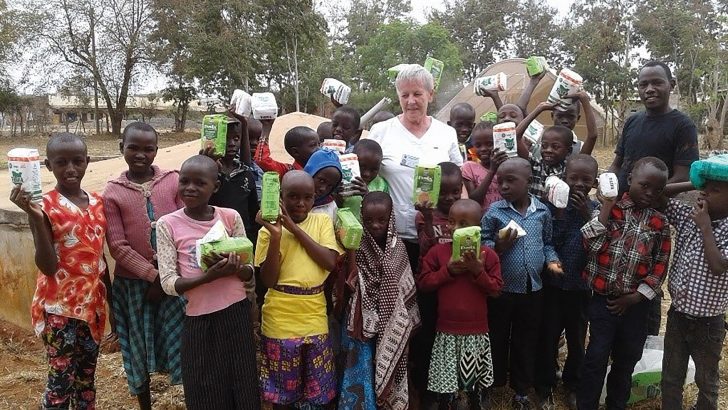Personal Profile
“There is great joy and fulfilment in being interested in and touching the lives of other people in some small way, however small. ‘It is in giving that we receive’,” says Anita McTernan, a volunteer nurse in a Sisters of Mercy, Mission Hospital in Mutomo, Kenya.
Anita is not a Sister of Mercy but a committed Mercy Associate. She is a lay volunteer who “decided to fulfil a dream that I had since I was a student nurse in London”. Mercy Associates follow the Ethos of the Mercy Sisters.
Anita is originally from Dromahair in Co. Leitrim and has been working in Kenya for over 20 years; she is due to retire this year at the age of 70. “When I arrived in 1999 I honestly thought I have come full circle to my second childhood. No electricity, no telephone, no water and no tarmac roads. That’s what I experienced as I grew up and that is what I found here.”
In 1999 the community, like the rest of sub-Saharan Africa was badly affected by HIV and AIDS. The majority of the hospital beds were occupied by HIV infected patients and about 500 people died of AIDS every day according to estimates by UNAIDS, the United Nations Programme on HIV/AIDS. “We decided that we needed to do something on prevention and so with funding from APSO (Agency for Personal Service Overseas) we set up a Youth Group of 120 members and we trained them on HIV Prevention using ‘Behaviour Change Process’.
“We went to all the Secondary and Primary Schools in the sub-county with the youth educating youth principle for the next 6 years,” says Anita about their hugely successful campaign. She is now the co-ordinator of the HIV Programme at Our Lady of Lourdes, Mutmo Hospital and its 7 outreach satellite clinics. “Our HIV program has a total of 225 children who are living with HIV and most are orphans.” She also co-ordinates a Healthy Hearts Programme.
Malnutrition is also responsible for many deaths in this community still, particularly in children.
“The most awful experience I had had here is watching a child die of hunger. She was dying on admission and it was too late for us to save her. She kept saying as she was dying ‘give me bread, give me bread’ despite the fact that we were giving her the bread.”
Anita says she has also been able to help many people in this position. She said one of her best experiences was saving a malnourished child that she spotted in a community as she was distributing food. “She was gasping in her mother’s arms, 15 months old and weighing only 3 kgs. I provided transport for her to hospital immediately and she was found to have TB among other problems including severe malnutrition. The doctor came and told me ‘we will not be able to save this one Anita’.
“But we did and today she is almost through primary school. I met her mother recently when she was telling someone that I had saved Pauline’s life. It was good to hear that positive comment.”
Anita said she has never regretted her decision and has been greatly encouraged and impressed by the work that had been done by the Sisters of Mercy in the previous 30 years “They built a hospital and provided primary health care in the community – they founded a primary school and a secondary school for girls not to mention the part they played in evangelisation in this part of Kitui.”
Last year 700 baptisms took place in the mission and 170 young people were confirmed. The community have Church weddings where 12 to 15 couples might get married at the same time. They also have an active Pontifical Missionary Children programme.
“My experience in Kenya has been very positive and very fulfilling throughout, despite living in a hardship area which was very remote and impoverished for the first 10 years,” she says.
This hospital is the only one in the area caters for a region with 180,000 people in the diocese of Kitui about 250 Km from Nairobi the capital of Kenya. The hospital has a staff of 107 people, all Kenyans except for Anita.
Due to a chronic shortage of water it is stored in 65 tanks when it becomes available and on occasions has to be trucked in from elsewhere in Kenya. Anita’s personal allowance is one bucket a day.
Since Anita arrived in Kenya life expectancy of AIDS victims has been improved due to new drugs and the risk of babies being born with AIDS has been minimised. Due to the work being done in the local area AIDS only affects 2.1% of people compared to 6.2% overall for Kenya. Those suffering from AIDS have a high risk of dying from TB.
African goats cost around €25 to €30 euro and are supplied to the carers of AIDS families. The family uses the milk and the only condition of supply is that the first kid born is supplied to another AIDS family.
In the Social Centre, in the Mission grounds local girls learn hairdressing and needlework thereby empowering them to be a source of income for their families.
“While our core focus is health care delivery, I also coordinate an education programme to give needy youth a chance to go to school, principally secondary school,” says Anita. For the past 8 years, with the help of friends she has supported 40 students per year through secondary school. “These are mainly girls who would never have had a chance to go to school and would have ended up in early marriages as second wives. Education will minimise that risk for them.”


 Mercy Associate Anita McTernan
Mercy Associate Anita McTernan 